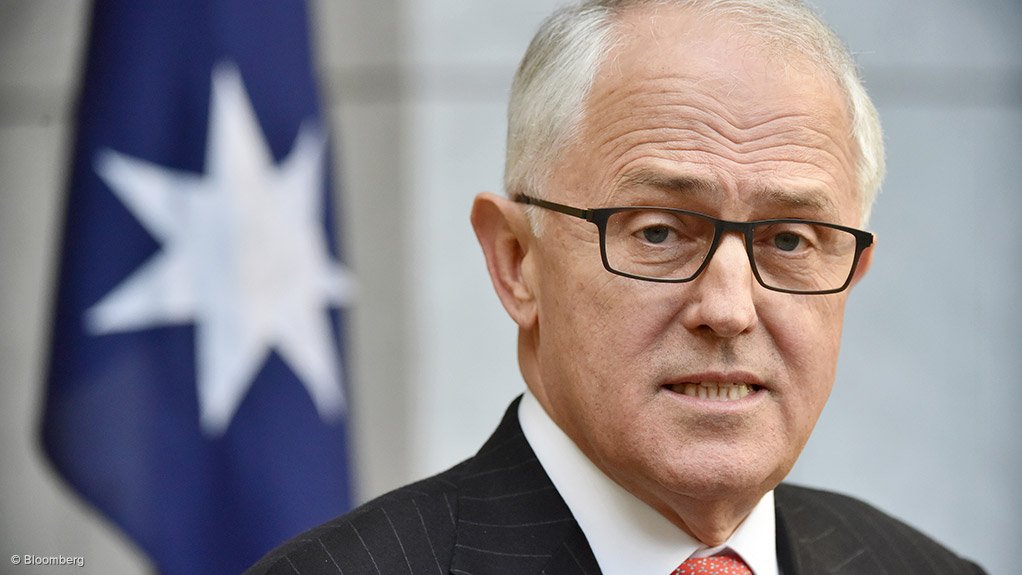PERTH (miningweekly.com) – The Victorian and New South Wales state governments have hit back at claims made by Premier Malcolm Turnbull that the state governments are failing to develop available gas resources, exacerbating the looming gas shortage faced by the Australian east coast.
Turnbull this week urged the New South Wales government to approve the Narrabri gas project being developed by oil and gas major Santos, saying it would add over 58 PJ/y of gas.
“The sooner that is brought on line the better. That is critical to the energy security of Australia, the energy security of this state, New South Wales, which I might say imports about 95% of the gas it uses, so it needs to generate more gas,” Turnbull said.
The Prime Minister also called out the Victorian government, saying its decision to prohibit the development of onshore gas resources was “extraordinary”.
Turnbull’s comments come amid warnings from the Australian Competition and Consumer Commission (ACCC) and the Australia Energy Market Operator (AEMO), which have both warned of major gas shortages starting in 2018.
The ACCC is projecting supply shortfalls of up to 55 PJ on the Australian east coast in 2018, with the AEMO placing the expected shortfall at between 54 PJ and 107 PJ, while the 2019 shortfall is expected to be between 48 PJ and 102 PJ.
However, New South Wales Premier Gladys Berejiklian called for a national approach to meeting energy supply needs, saying that the New South Wales government was progressing the approvals process for the Narrabri project.
Victorian Energy, Environment and Climate Change Minister Liliana D’Ambrosio blamed the expected shortfall in gas supply on gas exports by multinational companies, saying the Prime Minister’s insistance on hydraulic fracturing (fracking) showed how “out of touch” he was.
“Victoria is proud to be the first state to legislate a ban on fracking – it supports our farmers and preserves our state’s hard-won reputation for producing high-quality food.
“It is also important to make clear that there are currently no proven or probable onshore conventional gas reserves in Victoria,” D’Ambrosio said.
Meanwhile, the One National political party has threatened to use its political pull to block gas drilling in Queensland and to block any expansion of the coal seam gas (CSG) industry.
One Nation has revealed plans to block the opening of new gas reserves in Queensland, proposing instead that east coast demand should be supplied by gas from Western Australia.
The party also announced that it would support an inquiry into CSG and would impose a moratorium on new projects in Queensland’s southwest, if it came to power during the state’s next election.
Queensland’s State Development and Natural Resources and Mines Minister Anthony Lynham said that the shutdown of a major gas region would push up electricity prices in the state, and would cost jobs.
“This proposal will deny Queensland industry and Queensland jobs and almost decades of gas supply,” Lynham said.
“When the rest of Australia is seeking more sources of gas, One Nation wants to cut it off. This region has been producing petroleum and gas for Australian industry for 50 years,” he said.
“Exploration and extraction of gas is subject to state and/or federal environmental assessment, including impacts on groundwater. Queensland has done the hard work to develop our gas reserves for domestic and export markets.
“Queensland gas is helping put downward pressure on electricity prices for Australian homes and businesses."
The Australian Petroleum Production and Exploration Association (Appea) has slammed One Nation’s comments as an act of “economic vandalism”, saying it would expose Queenslanders to the risk of higher energy prices and blackouts.
“The Cooper basin in south-west Queensland accounts for 14.5% of Queensland’s natural gas supply and – most importantly – natural gas has been produced in the Cooper for 40 years without harming the environment or damaging the Great Artesian basin,” said Appea Queensland director Rhys Turner.
“One Nation doesn’t understand that natural gas is an essential source of energy for manufacturers and for electricity generation during times of peak demand. When workers and families get home during a hot Queensland summer and turn on the air conditioner they are using electricity produced from natural gas.”
Turner pointed out that the petroleum industry’s footprint in the Cooper basin represented a fraction of 1% of the land area, and that gas production from the Cooper basin is equivalent to 14% of Queensland demand and 4% of east coast demand.
Edited by: Mariaan Webb
Creamer Media Senior Deputy Editor Online
EMAIL THIS ARTICLE SAVE THIS ARTICLE
ARTICLE ENQUIRY
To subscribe email subscriptions@creamermedia.co.za or click here
To advertise email advertising@creamermedia.co.za or click here













